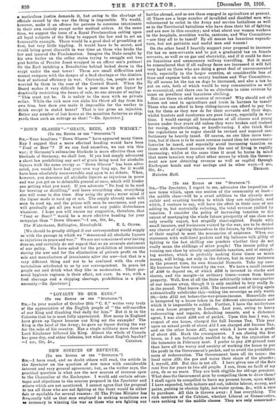"DOWN GLASSES "—" GRAIN, BEER, AND WHISKY." [To THE EDITOR
OF THE " SPECTATOR."] SIR,—Your headlines " Down Glasses" have appeared many times. May I suggest that a more effectual heading would have been " Food or Beer "? If we can feed ourselves, we can win this war; if Germany's submarine blockade is more effective than our blockade of Germany, we shall lose. If you had simply advocated a short law prohibiting any sort of grain being used for alcoholio liquors with the same energy as " Down Glasses " has been advo- cated, you would have had your own way long ago, for it would have been absolutely unanswerable and open to no debate. When, however, you denounce all alcoholic liquors as injurious in peace and war you get on to debatable ground at once, which will hinder you getting what you want. If you advocate " No food to be used for brewing or distilling," and leave everything else, everything else will come in due time. Stop using the grain; never mind if the liquor made is used up or not. The supply already made will soon be used up, and the prices will soon be enormous, and you will gradually get all you want without any public disturbance whatever. I hope you will excuse my suggestion, therefore, that " Food or Beer?" would be a more effective heading for your campaign than " Down Glasses."—I am, Sir, &c., The Waterhouse, Bollington, Macclesfield. E. L. OLIVER.
[We should be greatly obliged if our correspondent would supply as with the passage in which we " denounced all alcoholic liquors as injurious in peace and war." We are not conscious of ever having done so, and certainly do not regard that as an accurate statement of our policy. We have asked for the prohibition of intoxicants during the war and for the elimination of private profit on the sale and manufacture of intoxicants after the war—but that is a very different thing and not to be confused with the crude teetotalism attributed to us by our correspondent. In peace let people eat and drink what they like in moderation. Their per- sonal hygienic regimen is their affair, not ours. In war, with a food shortage and a shipping shortage, prohibition is a plain zecessity.—En. Spectator.]


























 Previous page
Previous page